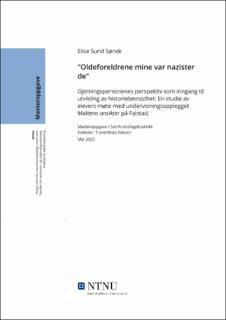"Oldeforeldrene mine var nazister de" Gjerningspersonenes perspektiv som inngang til utvikling av historiebevissthet: En studie av elevers møte med undervisningsopplegget Maktens ansikter på Falstad.
Master thesis
Permanent lenke
https://hdl.handle.net/11250/3003700Utgivelsesdato
2022Metadata
Vis full innførselSamlinger
- Institutt for lærerutdanning [3582]
Sammendrag
I mitt masterprosjekt har den overordnede problemstillingen vært «Hvordan kan minne- og historiekulturen etter andre verdenskrig, formidlet gjennom undervisningsopplegget Maktens ansikter, ha betydning for elevers utvikling av historiebevissthet?». Studien er forankret i de teoretiske grunnbegrepene; Historiebevissthet, historiebruk og minne- og historiekultur. For å analysere datamaterialet og peke på sentrale funn, delte jeg opp problemstillingen ved hjelp av tre forskningsspørsmål; Hvilken didaktisk betydning kan det ha å legge undervisning om okkupasjonsårene til et sted som Falstadsenteret? På hvilken måte er undervisningsopplegget preget av samtidskonteksten? Hvordan beskriver og ser elever på gjerningspersonene etter andre verdenskrig? Disse spørsmålene har vært avgjørende for å til slutt kunne svare på problemstillingen, og for utvikling av ny kunnskap.
I møte med problemstillingen og forskningsspørsmålene, var det ulike metoder som egnet seg for datainnsamling. Metodene jeg valgte var; observasjon av undervisningsopplegget, intervju med pedagoger som leder elevene gjennom undervisningen, og gruppeintervjuer med elever som har deltatt på undervisningen. Intervjuene var basert på en semistrukturert tilnærming, og i observasjonene opptrådde jeg som en fullstendig observatør. Analysemetoden jeg benyttet i møte med innsamlet datamateriale var tematisk analyse. Ved hjelp av denne fikk jeg et dypt innsyn det materialet jeg hadde samlet inn, og det oppstod kategorier som har vært sentrale for å kunne belyse og drøfte mine funn.
Min empiri viser at Maktens ansikter på flere ulike måter, kan ha stor betydning for elevers utvikling av historiebevissthet. I denne utviklingen står stedet sentralt, og fungerte både som et sannhetsbevis, et «kompass» for orientering i tiden, og som utgangspunkt for et kildemateriale elevene ellers ikke har tilgang til. Autentiske steder og gjenstander var noe som engasjerte elevene, og som vekket en interesse og motivasjon for å lære mer. Maktens ansikter er et dialogbasert undervisningsopplegg, og det legges opp til at elevene skal være samhandlende. Denne tilnærmingsmåten til historie, viste seg å være en styrke i elevenes utvikling av historiebevissthet. Empirien viser også at det finnes utfordringer ved å besøke minnesteder, og at man har en vei å gå når det gjelder utforskende undervisning, som står sentralt både i undervisningsopplegget og i den nye læreplanen. The overall aim and research question of this master's thesis has been to determine how the memory and history culture after the second world war, conveyed through the teaching plan Maktens ansikter, has an impact on students development of historical consciousness. This study is conducted using the theoretical basic concepts of historical consciousness, use of history and the memory and history culture. In order to analyze the research material and to determine key findings, the aim of this master's thesis was divided into three research questions. Which didactiv importance could the use of a place like Falstadsenteret have in the study of the occupational years? In what way is the teaching program influenced by the contemporary context? And how do students view and describe the perpetrators after the second world war? These research questions has been fundemental in order to answer the aim of this thesis, and in acquiring new knowledge.
In working with the aim and research questions of this thesis, I found that there were different research methods suitable for the data collection. The methods choosen were, observation of the teaching program, interviews with educators leading the students through the teaching program, and group interviews with students that have participated in the teaching program. The interviews conducted was based on a semi - structured approach, and in the observations I acted as a complete observer. The method of thematic analysis was used to present and discuss the findings in this thesis. Using this method gave me a deep insight into the collected material, and it helped uncover categories that proved fundemental in presenting and discussing my findings.
The findings from in this thesis suggests that the teaching program Maktens ansikter has a substantial impact on students development of history awareness in several different ways. In developing this awareness the study shows that the place where the teaching program is held is pivotal and works as evidence of truth, as a compass for orientation of these times, and as a base for key materials these students otherwise would not gain access to. Authentic places and objects was in this study shown to engage and peak the interest and motivation in the students desire to learn more about the subject. The faces of power is a dialog based teaching program that emphasizes on the students interacting with one another. This approach to the education of history proved to be a strength in the students development of historical consciousness. The findings from this study also shows that there are still some challenges connected to visiting memorial sites, and that there is still a long way to go when it comes to exploratory teaching, that is fundemental both in this teaching program and in the curriculum.
